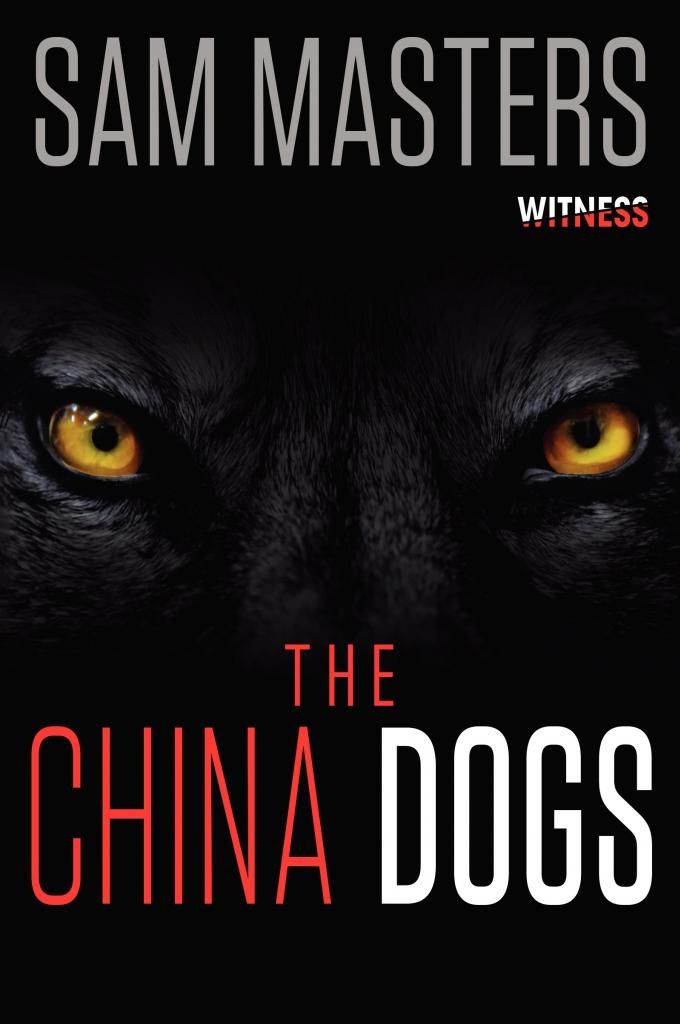
 Title: The China Dogs
Author: Sam Master
Genre: Thriller
Publish Date: August 19, 2014
Publisher: Witness Impulse an imprint of HarperCollins
Title: The China Dogs
Author: Sam Master
Genre: Thriller
Publish Date: August 19, 2014
Publisher: Witness Impulse an imprint of HarperCollins
~ Synopsis ~
Man’s best friend is about to become America’s worst enemy...
When a sudden rash of deadly canine attacks hits the greater Miami area, Lieutenant “Ghost” Walton, Special Ops, takes little notice. Blame it on the heat, a rare disease, or the fact that people just don’t know how to take care of their pets.
But when the body count rises, and the perimeter of blood and carnage spreads wider and wider, into the farthest reaches of Miami-Dade county, Ghost has no choice but to pay attention. Doggedly, he tries to uncover the link between these lethal incidents, but he doesn’t count on falling for a sassy out-of-towner with a dark past, nor does he expect to stumble onto a plot that threatens national security.

Where to Purchase


Chapter 1
Gobi Desert, Northeastern China
The silver buses drive across the land of endless sand. Onboard are prisoners from China’s notorious Death Row. Rapists, serial murderers, and child abusers.
Twenty men about to be given an extraordinary chance to live.
To wipe the slate clean.
The long vehicles that carry them are equipped with lethal electrocution equipment, state-of-the-art technology designed to deliver on-the-spot executions. The inmates can choose to stay on board and be quickly put to death; their organs harvested there and then and sold to those needing donations.
Or—when the doors swing open—they can run for their lives. Run into one of the largest deserts in the world and take their chances with what lies out there.
Air brakes hiss, sand sprays, and the five buses come to a syn- chronized stop in the blistering heat.
Three army copters hover in the sweltering air. Military bosses watch like circling vultures.
On cue, automated locks clunk and the big doors of the ve- hicles slide open.
Clouds of hot sand rise as the bare feet of desperate men jump and run from the vehicles.
No one remains.
Six miles away—six miles north, south, east, and west—the doors of four armored personnel carriers also open .
General Fu Zhang peers down like God. Watches life and death play out. People reduced to black dots, scattered like dung beetles. He can’t help but think it would be better for the men if they’d stayed on the buses.
Their deaths would be less painful.
The leader of China’s armed forces follows each and every fa- tality on his video monitor.
Nonchalantly, he waves a hand to the pilot to return to base.
He is pleased.
Seldom has he seen such efficient slaughter. Such economic carnage.
Project Nian is nearing completion.
About the Author
SAM MASTERS is a pseudonym for an author who has written seven books, including a bestseller that has sold in more than 30 countries. This is his first novel for Witness.

Money, Money, Money.
I was brought up
poor. Dirt poor. Had times when I was homeless and jobless. Slept on sofas of
friends and outstayed my welcome while I prayed I’d get a break. I did. More
than one. More than I deserved. And big,
big thanks to one and all who helped me when they could.
The
whole experience of having nothing (and noting to lose) taught me that ‘giving’
and ‘taking’ is much more than a financial experience. A transaction.
It’s
an emotional experience.
Borrowing
and lending money are both fraught with tensions. Especially if you’re borrowing
from, or lending to, people whom you regard as special – namely your friends
and family.
For
me, one of the worst things in the world was asking for something. Having to
borrow. Money topped that list. It
killed me to take a small loan from my first wife’s parents to help buy the
crappy car I needed to get to the crappy job on the other side of town. But
borrow I did. And paid back, I did too. In full. With thanks and what little
gifts I could afford to show my gratitude.
In fact, my wife and I didn’t go out, didn’t get takeaways or even
consider a holiday until the debt had been paid. Incidentally, I had to turn to
the in-laws because the cold-hearted clerks at the bank wouldn’t give me a
loan. More on banks later.
Anyway,
somewhere, deep inside my psyche, there’s a notion that if you have to borrow,
then you have to give it back and give it back as soon as possible.
Decades
after taking the loan for the crappy car, my second wife and I paid off the
mortgage on a not so crappy house that had five bedrooms, a lounge you could
land a plane in (okay maybe a tiny radio-controlled helicopter, like kids get
at Christmas) four acres of private land and even a small lake. It was an
amazing feeling to think it was ours. It wasn’t owned in any part by the goddamned
bank or building society. Whatever happened in life, we had somewhere nice and
safe to live, which we are acutely aware is more than many people in life
have. Lucky us. Very grateful us.
It
seems most people think the same way. You
borrow - you pay back. If you lend, then
you do so with kindness and understanding. Now lending itself is tricky. You
have none of the guilt of borrowing but there’s a whole different ball game
going on. Doubt.
You
wonder if you’re going to get your money back.
Now,
if you’re a financial institution, you cover this risk with insurances and of
course you charge interest and make sure that the whole deal ends up being good
for you.
But
not if you lend to friends or family.
In
that case, quite rightly, you suck up all the risk. You’re the one with the fat wallet so you swallow
down the doubt and you simply hope the ‘arrangement’ will turn out for the
best. Sadly, that promise to pay you
back ‘soon as possible’ often becomes a distant memory and the gaping hole in
your bank account is soon in danger of becoming an irreparable hole in your
relationship with the borrower. It even
gets to the point when you feel
guilty about bringing up the fact that you’re
still owed money.
Being
owed money sucks.
Being
owed a little suck a lot.
Being
owed big sums is enough to drive you wild with anger.
People
the world over are knifed, shot, tortured and murdered every day because of
money borrowed and not repaid. Welching
on a debt makes it personal. Not paying
up is a lack of respect. An act of dishonour. A very definite way of saying ‘Screw
you.’
So
what about the $1.2 trillion the US owes China.
Okay. Let’s do that again, but this time in
letters, it’s somehow more graspable.
Not
a million. Not a billion. Not even a
trillion.
One
point two, trillion dollars.
Man,
there’s a lot of doubt, guilt, respect, trust, disrespect and welching go on
behind that figure.
People
get their asses kicked for maxing out $1,000 credit card limits or going a
couple of hundred bucks overdrawn before payday.
But one point two trillion!
Folks,
come on now, ‘how did you let it get that big?’
Shout
and scream the question from Wall Street to the White House and you won’t get a
good answer. They’ll just tell you to
calm down and then blind you with banalities like ‘Calm down, it’s only 8 per
cent of public national debt. Nothing to worry about.’
$1.2
trillion is nothing to worry
about? Don’t people get their houses
taken off them if they default on crappy mortgages sold by indecent
brokers? Don’t banks bust your ass if
you accidentally go overdrawn before pay day?
But
$1.2 trillion is nothing to worry
about.
Yep,
it’s not.
They’re
right. Because everyone in US finance is way, way past worrying. The government is in so deep, there ain’t no
periscope long enough to pop up through the shit they’ve sunk in.
The
US owes a shitload more than just a trillion to China.
They
owe trillions to tons of other people (more than $14 trillion in total). Mainly to US citizens, banks and foreign
governments ($4.5 trillion to foreign government). Which means that nobody is
ever going to get back what they’re owed. It just can’t happen. One big pay
out, say to the Chinese, would knock the bottom bricks out of not only America’s
financial wall, but the whole western world’s as well. As one worried Republican remarked to the
Democrats when the then Chinese President Hu Jintao raised the debt issue, ‘Hu’s your daddy?’
But
the debt really is no laughing matter. What if the Chinese decided to call in
the loan?
If
they wanted all their money back, right now; say because their own growth was
stalling (which incidentally it is). And what if the US refused to even
negotiate new terms, let alone pay up in full?
Then
things would be bad.
Real
bad.
Maybe
even as bad as The China Dogs scenario.
Giveaway
Five BlueFire Downloads

No comments:
Post a Comment